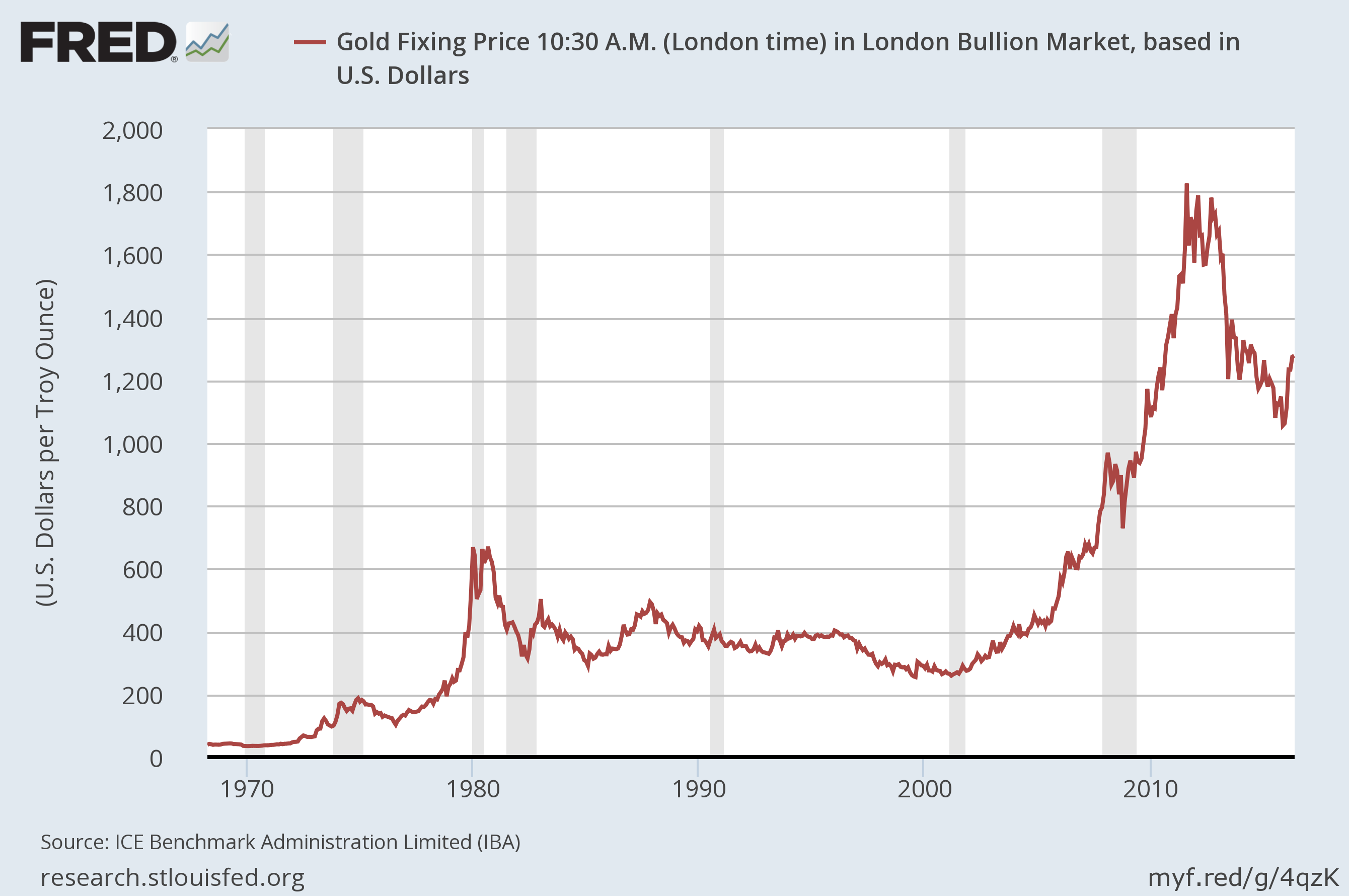Thinking About Buying Gold? Think Again
The precious metal makes for a nice anniversary present, but it's not a good investment.

Profit and prosper with the best of Kiplinger's advice on investing, taxes, retirement, personal finance and much more. Delivered daily. Enter your email in the box and click Sign Me Up.
You are now subscribed
Your newsletter sign-up was successful
Want to add more newsletters?

Delivered daily
Kiplinger Today
Profit and prosper with the best of Kiplinger's advice on investing, taxes, retirement, personal finance and much more delivered daily. Smart money moves start here.

Sent five days a week
Kiplinger A Step Ahead
Get practical help to make better financial decisions in your everyday life, from spending to savings on top deals.

Delivered daily
Kiplinger Closing Bell
Get today's biggest financial and investing headlines delivered to your inbox every day the U.S. stock market is open.

Sent twice a week
Kiplinger Adviser Intel
Financial pros across the country share best practices and fresh tactics to preserve and grow your wealth.

Delivered weekly
Kiplinger Tax Tips
Trim your federal and state tax bills with practical tax-planning and tax-cutting strategies.

Sent twice a week
Kiplinger Retirement Tips
Your twice-a-week guide to planning and enjoying a financially secure and richly rewarding retirement

Sent bimonthly.
Kiplinger Adviser Angle
Insights for advisers, wealth managers and other financial professionals.

Sent twice a week
Kiplinger Investing Weekly
Your twice-a-week roundup of promising stocks, funds, companies and industries you should consider, ones you should avoid, and why.

Sent weekly for six weeks
Kiplinger Invest for Retirement
Your step-by-step six-part series on how to invest for retirement, from devising a successful strategy to exactly which investments to choose.
It's been a typical spring. The stock market has been gyrating (sell in May and go away), a contentious election cycle is just heating up, Europe is still a mess, and then there is the Middle East. And just like mosquitoes, the gold bugs are out in full force.
"Avoid being a victim of the next crisis, and protect yourself with gold," the gold bugs love to say. Because as the "only" store of true value, owning gold is the best way to protect yourself from the ravages of the next crisis, right?
Not so fast. The world is full of worries; same as it ever was. I'm not so sure that we are in any bigger or more imminent danger than we always seem to be in. Even if the next financial/economic/energy/global unrest crisis is inevitable, it is no more imminent today than it was 10 years ago. The world only seems scarier.
From just $107.88 $24.99 for Kiplinger Personal Finance
Become a smarter, better informed investor. Subscribe from just $107.88 $24.99, plus get up to 4 Special Issues

Sign up for Kiplinger’s Free Newsletters
Profit and prosper with the best of expert advice on investing, taxes, retirement, personal finance and more - straight to your e-mail.
Profit and prosper with the best of expert advice - straight to your e-mail.
But with the concession that some formidable crisis is inevitable, what it the best way to prepare?
Investing is about comparative value. You have X dollars to invest. What alternatives bring the most value? Let's test gold. Is the glittery stuff really the best hedge against a crisis?
For this comparison, let's assume that you can buy all the gold in the world, versus something else. Warren Buffett offered a similar analysis in his 2011 annual letter to shareholders. At that time, he calculated that all the gold ever mined from the earth (currently about 171,000 tonnes) if melted together would form a cube that would roughly fit inside a baseball diamond. And it could all be yours for just $6.577 trillion! Tempting.
But consider some alternatives. Instead, let's say money was no object, and you could buy (as in the entire company): Amgen Inc (symbol AMGN), Merck (MRK), Procter & Gamble (PG) and Johnson & Johnson (JNJ). Why? Because no matter what crisis we may face, we will all still want medicine, toothpaste, diapers and toilet paper.
And why stop there? How about Verizon (VZ) and Apple (AAPL) because smartphone texting and tweeting will always be something to do; General Electric (GE) and Exxon Mobil (XOM) because oil is oil and big machines need oil to run; Microsoft (MSFT), Berkshire Hathaway (BRK.A) and International Business Machines (IBM) because who wouldn't want Bill Gates, Warren Buffett and Watson (IBM's artificial intelligence) working for them?; Amazon (AMZN) because people will always be buying stuff; Wells Fargo & Co. (WFC) because the guy that bought the giant gold cube will need to monetize it somehow; and Anheuser-Busch Inbev (BUD) because… well, if we truly face Armageddon, we'll all need a beer!
Okay; you might not be impressed and still opt for the gold. But here's my point. Based on their most recent dividend payments, if you owned each of these companies, they would be yielding an extra $97.643 billion per year in dividends! Your gold cube? It just sits there, doing nothing. It doesn't pay dividends, and it doesn't provide any real value (no beer, no toilet paper). That is called opportunity cost. By buying the gold cube, you forgo the opportunity to collect $97 billion a year between now and Armageddon.
Still not convinced which way to go? In addition to owning those fine companies, let's say you would have enough money left over to also buy about 385 million acres of farm land. If we faced a true global catastrophe, you could provide the world with 150 bushels of corn and 40 bushels of soy beans per acre per year. If things were to go really wrong, I'm thinking the dude with the gold cube would deliver it to you for just a few thousand of those acres.
What's this mean to someone without $6.577 trillion to invest, but maybe wants to put 10% or so of their savings into gold bars and coins? It's this: Gold comes with a huge opportunity cost. It sits there—sometimes for very long periods of time without doing anything. Gold hit $400 an ounce in November of 1979. It didn't cross the $400 threshhold and stay higher until August 2004. That's 25 years of lost opportunity and missed dividends. Sure, gold more than tripled in value from 2004 through 2011. But then, it dropped 40% until a recent bottom in November of last year. (It's now trading around $1,300.) Gold has hardly been a "store of value" over the years.

That's not to say gold is never a valid investment. But as a strategy, blindly buying and holding the metal doesn't make any more sense than blindly buying and holding any investment. Gold sellers will argue against buying paper gold such as the stocks of gold miners or an ETF such as GLD that buys actual gold to back its shares. You need the real stuff, they argue. But paper gold has one real advantage—it's very liquid. If we do have another financial crisis that drives the price of gold back to or above $1,800 an ounce, with GLD shares you can sell before suffering the subsequent post crisis drop.
Gold mining companies, such has Newmont Mining (NEM), benefit exponentially from an increase in the price of gold. Costs are fixed, so every incremental change in the price of bullion drops directly to the miners' bottom line. Shares of NEM have roughly doubled this year.
In other words, gold is a trade. Perhaps a nice wedding or anniversary present. It's not an investment.
Disclaimer: 401 Advisor, LLC is long the gold ETF (GLD) in our growth portfolios.
Bill DeShurko started in the financial services industry in 1987. He is the owner of 401 Advisor, LLC, a Registered Investment Advisor.
Profit and prosper with the best of Kiplinger's advice on investing, taxes, retirement, personal finance and much more. Delivered daily. Enter your email in the box and click Sign Me Up.

Bill DeShurko started in the financial services industry in 1987 and formed his own practice in 1994. He is the owner of 401 Advisor, LLC a Registered Investment Advisor located in Centerville, Ohio. After following fads, phases, and products of the day for nearly 30 years he hopes that his insights and experience can help today's investors navigate the financial markets.
-
 Nasdaq Leads a Rocky Risk-On Rally: Stock Market Today
Nasdaq Leads a Rocky Risk-On Rally: Stock Market TodayAnother worrying bout of late-session weakness couldn't take down the main equity indexes on Wednesday.
-
 Quiz: Do You Know How to Avoid the "Medigap Trap?"
Quiz: Do You Know How to Avoid the "Medigap Trap?"Quiz Test your basic knowledge of the "Medigap Trap" in our quick quiz.
-
 5 Top Tax-Efficient Mutual Funds for Smarter Investing
5 Top Tax-Efficient Mutual Funds for Smarter InvestingMutual funds are many things, but "tax-friendly" usually isn't one of them. These are the exceptions.
-
 Social Security Break-Even Math Is Helpful, But Don't Let It Dictate When You'll File
Social Security Break-Even Math Is Helpful, But Don't Let It Dictate When You'll FileYour Social Security break-even age tells you how long you'd need to live for delaying to pay off, but shouldn't be the sole basis for deciding when to claim.
-
 I'm an Opportunity Zone Pro: This Is How to Deliver Roth-Like Tax-Free Growth (Without Contribution Limits)
I'm an Opportunity Zone Pro: This Is How to Deliver Roth-Like Tax-Free Growth (Without Contribution Limits)Investors who combine Roth IRAs, the gold standard of tax-free savings, with qualified opportunity funds could enjoy decades of tax-free growth.
-
 One of the Most Powerful Wealth-Building Moves a Woman Can Make: A Midcareer Pivot
One of the Most Powerful Wealth-Building Moves a Woman Can Make: A Midcareer PivotIf it feels like you can't sustain what you're doing for the next 20 years, it's time for an honest look at what's draining you and what energizes you.
-
 I'm a Wealth Adviser Obsessed With Mahjong: Here Are 8 Ways It Can Teach Us How to Manage Our Money
I'm a Wealth Adviser Obsessed With Mahjong: Here Are 8 Ways It Can Teach Us How to Manage Our MoneyThis increasingly popular Chinese game can teach us not only how to help manage our money but also how important it is to connect with other people.
-
 Looking for a Financial Book That Won't Put Your Young Adult to Sleep? This One Makes 'Cents'
Looking for a Financial Book That Won't Put Your Young Adult to Sleep? This One Makes 'Cents'"Wealth Your Way" by Cosmo DeStefano offers a highly accessible guide for young adults and their parents on building wealth through simple, consistent habits.
-
 Global Uncertainty Has Investors Running Scared: This Is How Advisers Can Reassure Them
Global Uncertainty Has Investors Running Scared: This Is How Advisers Can Reassure ThemHow can advisers reassure clients nervous about their plans in an increasingly complex and rapidly changing world? This conversational framework provides the key.
-
 I'm a Real Estate Investing Pro: This Is How to Use 1031 Exchanges to Scale Up Your Real Estate Empire
I'm a Real Estate Investing Pro: This Is How to Use 1031 Exchanges to Scale Up Your Real Estate EmpireSmall rental properties can be excellent investments, but you can use 1031 exchanges to transition to commercial real estate for bigger wealth-building.
-
 Should You Jump on the Roth Conversion Bandwagon? A Financial Adviser Weighs In
Should You Jump on the Roth Conversion Bandwagon? A Financial Adviser Weighs InRoth conversions are all the rage, but what works well for one household can cause financial strain for another. This is what you should consider before moving ahead.